Connect with society and people through music education - Guildhall Connect - No.5
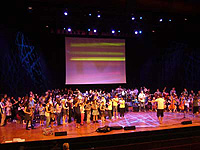 |
|
- - - - Concert Informaton - - - -
Event:Urban Sounds London '09
Venue:Barbican Concert Hall Date:1st July, 2009 19:30~ Ticket:Free, booking necessary Host:Guildhall Connect
- - - - Programme- - - -
1.Us: The Looking Game
2.Planet Folk: The Victor's Return Medley 3.Nashaa: Seven Oceans 4.Redshift: The Citadel 5.Morpeth Schools' Urban Playground Band+Globe Primary School Band:Urban Blues 6.Future Band: And it all happened in a little fish pond... 7.World in Motion Drummers: PULSE 8.Finale |
On 1st July, the day of the final concert has finally come, when all of the members of the workshops showed their results they had been working on through spring to early summer.
Towards the time of the final concert, they had 2 days of rehearsal on the last weekend, with more than 100 members from the workshops held from February to May: three groups,each from 'Urban Sounds (No.3)'World in Motion(No.4)', plus the drummers' group called 'iCan' and 'Pulse'. The Drumming project had been held throughout the year in several schools in East London, and the members of the band for this concert consisted of those who had found it especially interesting.
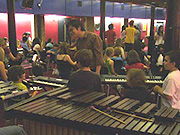
On the first day of the rehearsal, they split into their project groups and created pieces to perform at the concert under their leaders. Even in the same project, some had participated in all three workshops, while others had only attended one or two of them, so not all of them knew every piece of music. Under the leadership, they picked out what they thought was the essence of the music from each piece from that month, and created a 5-minute piece out of it. It was interesting that, even the same melody sounded like different music as time passed, with different members and instruments, and in a larger ensemble.
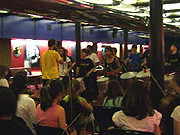
On the second day, these three project groups assembled and listened to the performance of the other groups. The children in the string and brass-based ensemble were very curious as they watched the drummers with huge drums hanging around their waists, beating them with brilliant handling of the drumsticks and steps. In a moment, they became very excited, listening to the lively rhythmical music, and were dying to play their music, as if they were thinking 'we can play well too!'
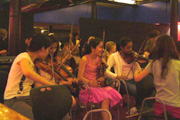
Then they started to create a piece for the finale, by picking out a much shorter version of the motif from each group's piece of music. The leader in charge of the finale was Joe, who had completed the master's course in Leadership at the Guildhall School and had five years of experience as a workshop leader. He led the music proposed by each group and combined them into one piece of music, using various types of body language.
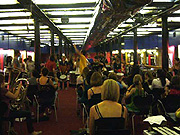
'Let's make some rule for the ensemble. When I make this sign while playing the music, it means we are going to stop, so pay attention to my count', or 'When I make an M as in a Melody with my fingers, be ready to play this melody'. Like this, he controlled the children of various ages and with various abilities with his gestures, and led from one motif to another. The children were not following a written word or notation, but their feelings as they played: 'What's it going to be like next?' 'I like this mood, it's so cool!'
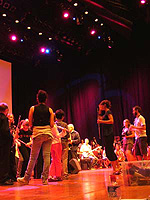
Finally, the day of the concert arrived. Although it is an evening concert, they gathered in the hall that morning for the final rehearsals. Even during the rehearsals, they were so excited to have the 2000-seat Barbican Hall all to themselves and perform on the stage. On the day, there were also other groups of musicians, such as the workshop groups based in other schools in East London, former Connect participants, the Barbican Young Orchestra and the LSO Fusion Orchestra, which the Guildhall School leads in partnership. There were over 200 young musicians altogether.
Each band had a rehearsal and checked their position on the stage, their entrance and exit line, and the volume and balance of the microphone for the soloist and the ensemble. They had a final fine-tune, because, since there were some new people who could not come at the weekend and perform the music together on the big stage, they still came up with new and better ideas. 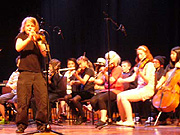 At the finale, there were over 200 musicians on stage, nearly twice as many as were present at the weekend. Almost half of them were hearing the music for the first time and making music together on the stage, so even the children or the leaders who created the music at the weekend felt that they were now creating new, exciting music that no one had never heard before. Every one of them showed the greatest concentration and paid attention to the leader while they were playing, because they never knew what would happen next till it ended. What an absorbing ability they had! They were unafraid to make changes for the better. Freshness, concentration, and the live aspect kept the ensemble attractive.
At the finale, there were over 200 musicians on stage, nearly twice as many as were present at the weekend. Almost half of them were hearing the music for the first time and making music together on the stage, so even the children or the leaders who created the music at the weekend felt that they were now creating new, exciting music that no one had never heard before. Every one of them showed the greatest concentration and paid attention to the leader while they were playing, because they never knew what would happen next till it ended. What an absorbing ability they had! They were unafraid to make changes for the better. Freshness, concentration, and the live aspect kept the ensemble attractive.
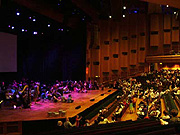 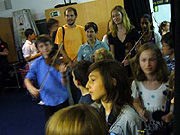 |
When it was getting close to curtain-up, their families and classmates began to gather in the hall. We could tell that the audience was also excited about finding the names of their family member or friend in the programme, and imagining how they were going to perform on such a big stage in front of them. How motivated would the musicians be, when they performed, knowing that 'the audience was definitely watching me', and 'they were expecting great things of me!'
Some visual effects were added to the stage. There were coloured stage lights, such as red or blue, to match the image of each band, or coloured, shaped spot-lights moving around the stage, fading in and out, and so on. For the programme 'World in Motion', in which they created music along with the story, there was a screen showing various obscure landscape and geometric designs, in collaboration with a film artist.
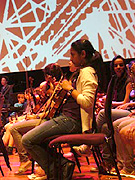 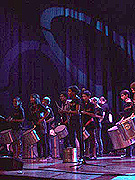
|
Some of them seemed to have arranged to wear particular outfits, such as black shirts, hats and red ties, or the same T-shirts and painted faces. Since so many people were involved, they had only one big change on the stage. The first four bands stayed on the stage until the interval. First, the band on the left-hand side performed, then the band in the middle stood up and performed, and so forth. By performing in turn like that, there was no need for them to enter and exit the stage during the performance. It went as smoothly as a professional concert.
After the concert ended, to great applause, the young people with their instruments appeared in the foyer and were greeted by their family and friends. They bade farewell to the leaders and friends whom they had met through the ensemble. One young saxophone player went home saying, 'It was a bit scary on the big stage, but I felt excited! I hope I can play on the stage again. Bye!'
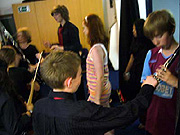
The workshop leaders of the Guildhall Connect are active internationally in sharing their skills. Sean Gregory from the first and second interview, Detta from forth 'World in Motion', and Joe from this article, have visited the Showa University of Music,and Kobe College in Japan, and collaborated with them. I believe that there will be further opportunities to experience this kind of workshop in Japan in the future.
Many pianists have learnt how to read and play music since they were very young, but have little experience of 'making music from scratch by choosing notes they like', or 'finding their own musical taste by just playing with notes'. Looking at examples of creative workshops like these, having the confidence to make music from scratch may be a great hurdle for us to overcome, but I felt that it was rather about taking away all of the hurdles and accepting any range of age, ability, interest, and musical taste, 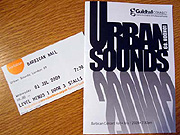 and simply appreciating who we are, and what we have.
and simply appreciating who we are, and what we have.
I believe that, by devoting time to being involved in such a creative experience, children who learn music through the piano and also the piano teachers who try to cultivate the musical ideas of their students can find their musical personality, find their way to communicate with people through music, and develop their potential talent for music.
Chigusa Futako








